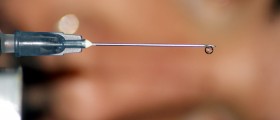
Celiac disease is an autoimmune disorder of the small intestine. It predominantly affects genetically predisposed people. In children the disease and characteristic symptoms develop three to five months after the child has consumed gluten-containing foods. In some cases the interval between the initial consumption and the occurrence of symptoms may be even shorter.
Symptoms and Signs of Celiac Disease in Children
The symptoms are not the same in all children and they also vary in intensity. After being fed with gluten-containing foods a child refuses to be fed and consequently loses weight. There is obvious irritability. The abdomen of the affected child becomes distended and the stool is abnormal, sometimes large, pale and offensive. The child may also suffer from diarrhea. The stool in celiac children normally floats due to the high contents of air and fat. There is also occasional vomiting especially after consumption of gluten-containing foods. In certain cases children may develop serious diarrhea and consequent dehydration.
In older children the symptoms may be subtle and include poor appetite, poor growth and anemia. Adolescents may be unable to concentrate and suffer from many mood changes such as irritability, crankiness etc.
All the previously mentioned symptoms develop as a consequence of the damage to the mucosa lining of the small intestine. The loss of absorptive surface results in improper digestion and absorption of food. The food rich with gluten simply cannot be processes since it causes an immunological reaction.
If the person does not stop consuming foods rich in gluten he/ she is at increased risk of further destruction of the small intestine. This eventually results in malapsorption of vitamins, minerals, proteins, amino acids, sugars and fats.
Diagnosis and Treatment for Celiac Disease in Children
The disease can be confirmed by the presence of specific antibodies in the blood called tissue transglutaminase (anti-tTG). The level of these antibodies is typically high in children suffering from celiac disease. Definitive conformation of celiac disease is obtained after a biopsy of the small intestine.
The only treatment modality for children suffering from celiac disease is a gluten-free diet. The diet reduces and eliminates all the symptoms of the disease in children with abnormal small intestine biopsy and serious symptoms of celiac disease. Furthermore, the diet is also helpful for children with an abnormal small intestine biopsy who do not have symptoms of the disease but represent high-risk group. And finally, the diet is excellent for children who have developed dermatitis herpetiformis.
The parents are supposed to consult a well experienced dietitian who will prescribe proper diet. In order to prevent reoccurrence of the symptoms and further damage to the small intestine the child must strictly stick to the diet.
















Your thoughts on this
Loading...